Brief • 5 min Read
The latest trends in culture and society from The Harris Poll.
This week, there’s a lot of talk about a ‘soft’ landing. The S&P is up 22% this year. The U.S. economy grew 2.4% (over 1.8% projections). Wage growth is propping up consumer spending. So why are consumers still glum? In our America This Week survey, fielded from July 28th to 30th, among 2,040 Americans, nearly two-thirds (68%) are worried about affording their living expenses, and more than half (52%) of losing their job.
Maybe the media is to blame? New Harris research this weekend shows how one’s media consumption and distrust of macro media may create a doom-scrolling effect on economic attitudes, where perception is worse than reality:
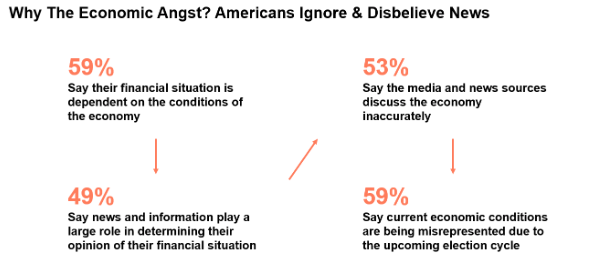
Four new Harris Polls caught our eyes this week: First, climate change is slipping into American dreaming (or nightmares). We then detail how rookie managers make work worse for everyone (especially women). Also, Libby and Abbey from our Thought Leadership Practice detail the new AND phenomenon where two things can be true simultaneously. Lastly, we cover a clear call for better maternity leave for American women.
You can download the new ATW monthly summary tabs and June deck here.
Climate Change Is Changing How We Dream: TIME-Harris Poll
Studying dreams can be slippery. We only sometimes remember them, and interpreting them is highly subjective. But, according to our latest survey with TIME, climate change has woven itself into American dreaming quite clearly.
- Climate dreaming is more pervasive for younger Americans: The majority (57%) of Gen Z and Millennials have dreamed about climate change, compared to (35%) of Gen Xers and just (14%) of Boomers.
- Climate change makes for bad dreams: Most people’s climate dreams involve extreme weather or natural disasters; fewer are about mosquitoes and locusts or political leaders and laws. And feelings of stress and fear were reported the most when dreaming about climate change (37%, 36%).
- People of color are among the most vulnerable to the impacts of climate change, and it’s reflected in dreams: Half of all people of color said they had dreamed about climate change at least once in their lives, compared to just (28%) of white people.
- Even location matters when it comes to climate dreams: Those living in the Western U.S. – where drought, heat, and wildfires are all worsening due to rising global temperatures – were more likely to report a climate dream (44%) compared to a third of people across the South, Northeast, and Midwest. And half of the people out west – and the same number in the Midwest – had dreams filled with extreme weather (v. Northeast: 46%, South: 37%).
Takeaway: Now and then, society collectively experience moments to such an acute degree that it changes our dreams. The pandemic certainly did this, as have the world wars and 9/11. The question is whether enough people are feeling climate change acutely enough that it is systemically infiltrating our dreams at a population level – and our surveys seem to show that it’s starting too.
Rookie Managers Spark Workplace Anger: Oji Life Lab-Harris Poll
In partnership with Oji Life Lab, as featured in Fortune, if you thought stepping up into a leadership position was tough for new managers, then spare a thought for their first reports.
- 2 in 5 (40%) workers said that working under a first-time boss has been the source of “stress or anxiety about going to work” and dwindling motivation – causing a third to reconsider working at their company entirely. About a fifth said they had trouble sleeping under a newly promoted manager.
- For women, first-time managers had an even more significant negative impact: Almost half of female staffers reported feeling stress or anxiety when working for a fresh-faced boss, compared to just over a third of male employees. Women were also more likely to have negative feelings about their career path and poor quality sleep at the hands of a new boss.
- Perhaps most alarming for corporate leaders, new bosses could be inadvertently sabotaging companies’ efforts to close the gender gap and pull women through the ranks: (40%) of the women surveyed cited new managers as fueling their desire to quit, compared to (29%) of men.
- Moreover, this experience worsens with age: Women over 55 were likelier to rate new managers as weak at “handling difficult situations” and “providing feedback.”
Takeaway: Linda Hill, a Harvard University professor of business administration who has studied management for over four decades, told Bloomberg that this might be because “most new managers believe that to treat people fairly is to treat them the same way.” But different groups have specific needs and concerns – like childbearing and menopause – that require targeted treatment from managers.
The AND Era: Harris Poll Thought Leadership Practice
With the rapid advancement of technology facilitating this fast-paced categorization process – distinguishing ‘right/wrong,’ ‘love/hate,’ and ‘buy/avoid’ – our humanity appears to lag. Fortunately, there’s a glimmer of hope – younger people are questioning this binary perspective, and introducing a more inclusive era – The “AND” Era, details the latest report by The Harris Poll Thought Leadership Practice.
- Money – Splurgy & Stingy: Consumers are embracing a “split-brain budget” cutting back on basics – (69%) have cut out more in-between spending – but making room for personal luxuries as (63%) of Americans say they aren’t going to deprive themselves of the comforts of life now for a future that feels it could change at any moment.
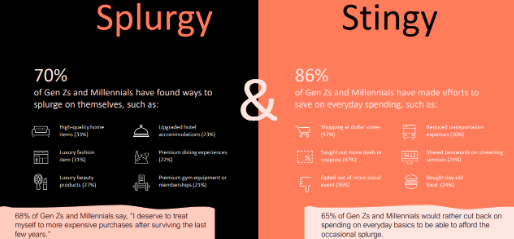
- Work – Quiet & Loud: (70%) of Americans believe “quiet quitting is a loud statement by employees about what they are looking for.” And most don’t want work to be everything, with (83%) trying to avoid making work their whole life.
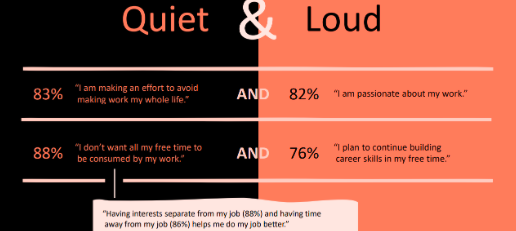
- Activism – Protesters & Pacifists: Nearly all Americans (95%) are frustrated about the state of at least one issue in America, and half (50%) say it’s essential to get angry about issues to drive change. However, they also believe kindness can prevail, as (76%) say compassion will ultimately help us overcome polarization.
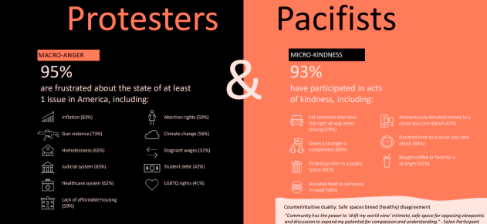
Takeaway: “The future is unfolding with more complexities and confusion than ever before,” says Abbey Lunney, Managing Director. “Meanwhile, people feel like their choices and opinions live in an illusionary binary world, forcing them to check one box or another. But in today’s world, we can forge a different pathway to acknowledge that two things can be true simultaneously.”
Maternity Leave Essential to Healthy Moms and Babies: HealthDay-Harris Poll
The pregnancy and birth journey is a pivotal moment in a woman’s life, and while miraculous, it does not come without risk, some of which may be avoidable. And according to the recent State of Maternal Health in America Study in partnership with HealthDay, as covered by U.S. News, maternity leave is seen as fundamental in improving health outcomes for mothers, babies, and infants.
- Less than half (40%) of Americans knew that the U.S. has the highest maternal mortality rate among developed countries. However, they are united that more needs to be done to make it safer for expecting mothers:
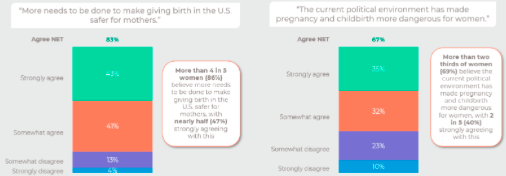
- As a result, the belief that maternity leave is crucial to improving healthy outcomes is widely held: Nearly 9 in 10 Americans believe that maternity leave is essential to improving health outcomes for mothers (88%) and babies (89%).
- The current four-week average of maternity leave in the U.S. needs to be more: Americans believe the standard minimum length of paid maternity leave in the U.S. should be 15 weeks, on average, with (25%) thinking it should be at least 20 weeks. On average, women (18-34) believe it should be 20 weeks.
Takeaway: “Even though most Americans don’t know that the U.S. has the highest rate of maternal mortality among developed countries, the vast majority agree that more needs to be done to make giving birth in the U.S. safer for mothers – including nearly half who strongly agree with this sentiment – suggesting that, despite gaps in awareness of key facts when it comes to maternal and infant mortality, there exists a widespread belief that the ‘status quo’ is simply not good enough,” said Kathy Steinberg, vice president of media and communications research at the Harris Poll.
Subscribe for more Insights
Subscribe to our newsletter for the latest trends in business, politics, culture, and more.
Download the Data
This survey was conducted online within the U.S. by The Harris Poll from July 28th to 30th among a nationally representative sample of 2,040 U.S. adults.
Related Content








